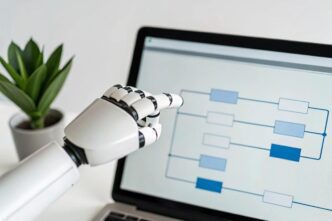Executive Summary
The Trajectory So Far
The Business Implication
Stakeholder Perspectives
Artificial intelligence is fundamentally reshaping how businesses operate across every sector globally, ushering in a new era of efficiency, strategic agility, and competitive advantage. This profound transformation is occurring now, as organizations leverage AI to automate routine tasks, optimize complex operations, enhance decision-making, and personalize customer experiences. By integrating AI into their core processes, companies are not merely improving existing workflows but are redefining their operational models and strategic capabilities to unlock unprecedented growth and innovation.
Understanding AI’s Role in Business Transformation
AI’s impact extends far beyond simple automation, providing businesses with the capacity to analyze vast datasets, predict future outcomes, and interact with customers in sophisticated ways. This shift empowers companies to move from reactive responses to proactive strategies, anticipating market changes and consumer needs. The technology acts as an intelligent layer, augmenting human capabilities and enabling more informed, data-driven decisions at every level of an organization.
Beyond Automation: Augmentation and Intelligence
While AI excels at automating repetitive and rule-based tasks, its true power lies in its ability to augment human intelligence. AI systems can process and interpret information far more quickly and comprehensively than humans, identifying patterns and insights that would otherwise remain hidden. This augmentation frees up human employees to focus on higher-value activities such as creative problem-solving, strategic planning, and complex interpersonal interactions.
Key Areas of AI-Driven Business Process Transformation
The application of AI spans numerous business functions, each benefiting from enhanced speed, accuracy, and intelligence. From back-office operations to front-line customer engagement, AI is proving to be a versatile tool for driving significant improvements. Its adaptability allows for tailored solutions that address specific industry challenges and opportunities.
Operational Efficiency and Automation
AI is a cornerstone of modern operational efficiency, streamlining processes and reducing manual effort across the enterprise. By automating mundane tasks, businesses can significantly cut costs and accelerate execution times. This leads to a leaner, more agile operational footprint, capable of responding rapidly to market demands.
Robotic Process Automation (RPA)
RPA, often powered by AI, automates repetitive, rule-based digital tasks by mimicking human interactions with software systems. This includes data entry, form processing, and report generation, freeing human employees from tedious work. The result is increased accuracy, reduced operational costs, and faster processing times for high-volume transactions.
Supply Chain Optimization
AI algorithms analyze vast amounts of data—including weather patterns, geopolitical events, and consumer demand—to optimize supply chain logistics. This enables more accurate demand forecasting, inventory management, and route optimization, minimizing delays and waste. Companies can achieve greater resilience and responsiveness in their supply chains, adapting quickly to disruptions.
Predictive Maintenance
In manufacturing and asset management, AI-driven predictive maintenance monitors equipment performance in real-time to anticipate potential failures. Sensors collect data, which AI analyzes to predict when maintenance is needed, preventing costly downtime and extending the lifespan of machinery. This proactive approach significantly reduces operational risks and maintenance expenses.
Enhanced Decision-Making and Strategy
AI empowers businesses with superior analytical capabilities, transforming raw data into actionable insights that inform strategic decisions. This shift from gut-feeling to data-driven strategy provides a significant competitive edge. Leaders can make more confident choices, backed by robust evidence and predictive models.
Data Analytics and Insights
AI-powered analytics platforms can process and interpret massive datasets, uncovering complex correlations and trends that human analysts might miss. These insights are crucial for understanding market dynamics, customer behavior, and operational bottlenecks. Businesses can then leverage this intelligence to refine strategies, identify new opportunities, and mitigate risks effectively.
Personalization and Customer Experience
AI enables hyper-personalization by analyzing individual customer data to deliver tailored product recommendations, marketing messages, and service interactions. Chatbots and virtual assistants provide instant, 24/7 support, improving satisfaction and loyalty. This personalized approach fosters stronger customer relationships and drives repeat business.
Risk Management and Fraud Detection
Financial institutions and other businesses use AI to identify and mitigate risks, from detecting fraudulent transactions to assessing creditworthiness. AI algorithms can spot anomalies and suspicious patterns in real-time, significantly enhancing security measures and reducing financial losses. This proactive risk management protects both the company and its customers.
Innovation and Product Development
AI is not just optimizing existing processes; it is also a powerful engine for innovation, accelerating research and development cycles. It allows companies to explore new product ideas and create novel solutions more rapidly. This capability fosters a culture of continuous innovation, keeping businesses at the forefront of their industries.
Generative AI for Content Creation
Generative AI models can create diverse forms of content, from marketing copy and social media posts to code and design prototypes. This dramatically speeds up content production, allowing marketing and product teams to experiment with more ideas and reach audiences more effectively. It also opens up new avenues for personalized and dynamic content experiences.
Accelerated R&D
In fields like pharmaceuticals and materials science, AI significantly shortens the research and development timeline. It can simulate experiments, analyze vast scientific literature, and identify promising compounds or designs. This capability allows companies to bring new products and solutions to market much faster than traditional methods would permit.
Strategic Implications and Competitive Advantage
Adopting AI is no longer optional; it is a strategic imperative for businesses aiming to maintain relevance and achieve sustainable growth. Companies that successfully integrate AI into their operations gain a substantial competitive advantage. This advantage stems from improved efficiency, superior insights, and a greater capacity for innovation.
Reshaping Organizational Structures
The integration of AI often necessitates a re-evaluation of organizational structures, shifting towards more agile, data-centric teams. Roles may evolve, with a greater emphasis on data scientists, AI engineers, and human-AI collaboration specialists. This transformation supports a more dynamic and responsive corporate environment.
Cultivating an AI-First Culture
Successful AI adoption requires more than just technology; it demands a cultural shift within the organization. Fostering an “AI-first” mindset encourages employees to think about how AI can enhance their work and solve business challenges. This involves continuous learning, experimentation, and a willingness to adapt to new ways of working.
Ethical AI and Responsible Deployment
As AI becomes more pervasive, businesses must prioritize ethical considerations in its deployment. This includes addressing issues of bias in algorithms, ensuring data privacy, and maintaining transparency in AI decision-making. Responsible AI practices build trust with customers and stakeholders, mitigating potential reputational and regulatory risks.
Challenges and Considerations
While the promise of AI is immense, its implementation is not without challenges. Businesses must navigate complexities related to data, talent, and integration to fully realize AI’s benefits. Addressing these hurdles proactively is crucial for a successful AI transformation journey.
Data Quality and Governance
AI systems are only as good as the data they are trained on, making data quality and governance paramount. Businesses must invest in robust data collection, cleaning, and management processes to ensure AI models produce accurate and reliable insights. Poor data can lead to biased outcomes and flawed decision-making.
Talent Gap and Reskilling
There is a significant demand for AI specialists, creating a talent gap that many organizations struggle to fill. Companies must invest in reskilling their existing workforce and attracting new talent with AI expertise. This includes training employees in AI literacy, data science, and human-AI collaboration.
Integration Complexities
Integrating AI solutions with existing legacy systems can be complex and time-consuming. Ensuring seamless data flow and interoperability between new AI tools and established infrastructure is a critical technical challenge. A phased approach and careful planning are essential for successful integration.
The Future of Business with AI
The ongoing integration of artificial intelligence into business processes marks a pivotal moment in corporate evolution, fundamentally altering how organizations create value and compete. From optimizing daily operations to driving strategic innovation, AI is a catalyst for unparalleled efficiency, deeper insights, and transformative customer experiences. Businesses that strategically embrace AI, navigate its complexities, and foster an AI-centric culture will be best positioned to thrive in this new intelligent era, ensuring sustained growth and a decisive competitive edge.








